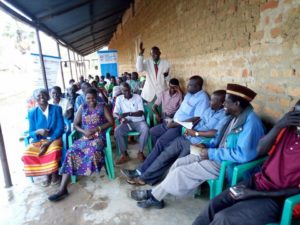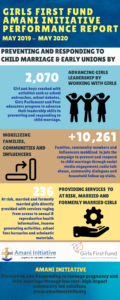What has been taking place
our projects
On-going projects

Thematic Area- Child, Adolescent and Maternal Health
Right 2 Grow
Project Summary
Project Name:- Right 2 Grow
Project period:- 1st January, 2021 – 31st December, 2026
Funder:-The Dutch Ministry of Foreign Affairs through the Movement for Community led Development Uganda.
Geographical area:- Maracha and Arua Districts.
Project brief
The R2Grow program in Uganda aims for decision-makers and key stakeholders to jointly and effectively address undernutrition in Uganda in a multisectoral, gender-sensitive, and inclusive way to achieve the ultimate goal of the program which aims to ensure that; “Every child in Uganda is able to achieve its potential.”
Project Outcomes
The main aim of the project is to strengthen civil society to advocate for an enabling environment to tackle stunting reduction for children under 5 in Uganda. Stunting rates remain high between 22.9 to 40.6% in the project Districts.
Specific Activities
1. Undertake a mapping exercises to identify potential MCLD members in advocacy for better food,
nutrition and WASH services.
2. Identify capacity needs of communities, especially women, adolescent girls and people with disabilities, to address barriers to practicing good food, nutrition and WASH practices. (Make documentation of statistics, evidence, facts, and amplifying impact through portraying voices of communities)
3. Organise annual essay competitions for boys and girls in P.6 and P.7
4. Publish and disseminate the best essays.
5. Map and identify model homes with good nutrition and WASH practices.
6. Contribute to a critical mass of supporters for profiling the communities’ food, nutrition and WASH issues, to attract the attention of decision makers. (Collection of evidence from the communities).

Thematic Area- Education
School Financial Health Project
Project Summary
Project Name:- School Financial Health Project
Project period:- 15th July, 2020- 31st September, 2022
Funder:- Edify Uganda
Geographical area:- National
Project brief
To support low cost Christian private schools improve their financial through trainings on accounting, business and financial management.
Project Activities
1)Business Accounting and Financial Management Assessment
2)Training of Trainers
3)Cluster BAFF trainings
4)School follow up
Project Outcomes
Outcome #1. Schools know how to manage their financial activities and working together in supporting and improving the financial management of your school.
Outcome #2 School understand their roles in relation to accountability and transparency.
Outcome #3 Schools understand the responsibilities of the Board of Management and the Head Teacher in school budgeting and planning,
Outcome #4 Schools understand how the Head Teacher and the Board of Management need to work cooperatively together.
Outcome #5 Schools understand their roles and responsibilities in the recording and reporting of financial information.
Outcome #6 Schools understand how they can prepare themselves to get and manage a loan.
Outcome #7 Schools understand the Basic Requirements and Minimum Standards Indicators for Education Institutions in relation to Finance Generation and Management.
- ect.

Thematic Area:- Education
Keep Me In School
Project Summary
Project Name:- Keep Me In School
Project period:- 1st January, 2022- 31st December, 2027
Funder:- Individual Donors
Geographical area:- National
Project brief
Goal of the Keep Me In School Campaign is to facilitate every child with an
equal opportunity to quality education and to be in position to use this education to foster the development of his/her homestead, community and
country.
Project Outcomes
1)All Children have an equal access to a good quality education especially for the girl child & disabled children.
2)Establishing a school environment with structures to retain children in school and efforts to reach out to children not in school with the direct
involvement of parents, communities and concerned stakeholders.
3)Nurturing the cognitive, social and ethical development of children.
Project Activities
1)School outreaches
2)School fees bursaries and supporting vulnerable children with scholastic materials
3)Supporting leadership skills and engagement of student leadership structures.
4)Mobilizing parents to take their children to school.
How you can support or benefit from the Keep Me In School Campaign.
1)Reach out to us through info.amaninitiative@gmail.com, +256 703154084 (whatsapp) to sponsor a child or contribute to this campaign.
2)Access the school fees bursary application fees Bursary Application Form- 2022

Thematic Area:- Child Protection and Safeguarding
Amplified Community Action Against- Teenage Pregnancy and Child Marriage (ACAA-TPCM) Project
Project Summary
Project Name:- Amplified Community Action Against- Teenage Pregnancy and Child Marriage (ACAA-TPCM) Project
Project period:- 15th June, 2020- 14th June, 2022
Funder:- Capital for Good through Girls First Fund
Geographical area:- Maracha District, (Oleba Sub-County, Kijomoro Sub-County and Oluffe Sub- county and , Arua (Vurra Sub-County )
Project brief
Amani Initiative will implement work that will focus on setting up a community taskforce of change agents involving multiple stakeholders as champions against child marriage. The stakeholders will be mobilized to become change agents in the fight against negative norms and behaviors that contribute to teenage pregnancy and child marriage, including lack of access to SRHR services and information. The stakeholders to be targeted include key decision makers and influencers including parents, the judiciary, police, local council leaders, religious leaders, and motorcycle taxi drivers. Similarly, school-level task forces involving head teachers, senior women teachers, and PTA chairpersons will also be initiated.
Amani Initiative will work alongside both girls and boys by providing a platform through which they can access age appropriate sexual & reproductive health information to enable them to make informed decisions to prevent teenage pregnancy and child marriages. Girls who are mothers will also participate in self-supporting groups. Through these groups they will have access to loan facilities to start basic income generating activities and access to sexual & reproductive health services for social and economic empowerment.
Project Outcomes
Outcome #1 Increased capacity of community change agents to prevent child marriages and teenage pregnancies through awareness creation and referral of victims to relevant authorities.
Outcome #2 Improved community knowledge, behaviors and mindsets on the dangers of child marriages and teenage pregnancy
Outcome #3 Increased access to sexual reproductive health information and services
Outcome #4 Increased socio-economic security for child mothers and vulnerable communities.
Project key activities and targets
30 Community Agents to be identified and trained to take lead in community sensitization, prevention, identification, and reporting cases of child marriage and teenage pregnancy to authorities.

80 child mothers to be provided with a safe space in which to gain entrepreneurship, financial literacy and life skills as well as access sexual and reproductive health information and services. The child mothers are to be organized into self supporting Village Saving Loan Schemes through which they will have access to low cost financing for their income generating projects.
480 adolescents (16-24) to receive age appropriate sexual and reproductive health education, leadership skills and other life skills to be in position to make informed life decisions.
448 in school youths to be supported with scholastic materials such a pens, books, mathematical sets, school bags so to provide them with a conducive environment to learn but also motivate them to keep in school and study hard.
960 parents from partner schools to be trained on aspects of parenting skills and relevant sexual and reproductive information that they can use to guide their children.
1,600 in school children reached out during school based awareness campaigns on prevention of teenage pregnancy, child marriage and children protection.
32 school administrators supported to come up with school policies that promote child protection and safe guarding with a focus on prevention, identification, response and reporting of school based cases of child abuse.
Thematic Area:- Child, Adolescent and Maternal Health
Consolidated Community efforts for Prevention and Response to HIV & TB in Maracha District.
Project Summary
Project Name:- Consolidated Community efforts for Prevention and Response to HIV & TB in Maracha District.
Project period:- 1st April, 2021- 31st September, 2022
Funder:- Infectious Disease Institute/CDC
Geographical area:- Maracha District.
Project brief
The project aims to attain and sustain HIV epidemic control in the West Nile region of Uganda through optimization of high impact interventions to achieve UNAIDS 95:95:95 targets; and strengthening national, regional, district level capacities to meet MoH minimum performance.
Project Activities
| 1.0Refresher orientation for project team |
| 1. Follow up of lost clients (both HIV and TB) – 45% |
| 2. Home based care (counselling and PSS to non-suppressed clients ) -15% |
| 3. House hold TB screening (Not contact tracing) – 5% |
| 4. Follow up of mother baby pairs to complete the emerging infectious diseases (EID) cascade -15% |
| 5. Index client testing (both at house hold and at their office) – 10% |
| 6. Community facility linkages (referrals for ANC, GBV, TB etc.) -10% |
| 7. Testing Men 25+ |
| 8. Suport Supervision |
PREVIOUS PROJECTS

Adolescent Sexual & Reproductive Health
Community Skyrocket Project
Project Summary
Project Name:- Building Capacities of Community Members as Grassroot Soccer Coaches
Project period:- 1st October, 2020- 31st December, 2020.
Funder:- Learning Spark Fund
Partners:- Joy for Children Uganda
Geographical area:- Maracha District, Terego District and Arua District.
Project brief
The objective of Community Skyrocket project is to learn what communities know and do in relation to addressing adolescent female sexuality and draw out implications for improving the design, implementation and evaluation of Child Marriage programmes.
Project target
| Who ? | How many? | Why ? |
1 | Adolescent girls and boys | 48 | Sexuality not only affects girls but also boys. Child marriages cases happen when both adolescent don’t know about their reproductive health systems they are vulnerable to early pregnancies and child marriages, But when they are aware of their of themselves and health reproductive health system they are able to respond to alternatives and able to make informed decision or better choice. Therefore, adolescent girls and boys stand a higher chance of providing knowledge that can inform and influence programs on ending child marriages
Girls and boys are often primary decision-makers to engage in child marriage either innocently or because they are vulnerable to circumstances. Engaging them in discussions and generating knowledge on the value of education for girls/boys and the negative consequences of child marriage can persuade families and communities to opt out of early marriage and influence programs that support girls to realize their aspirations by showing alternative possibilities for their future. |
2 | Community institutions/ stakeholders e.g Religious and cultural leaders and even perpetrators of child marriages | 48 | Over 80% of the world’s population professes a religious belief. As spiritual guides, religious leaders are among the most respected figures in many communities, and often contribute to prescribe which behaviours are acceptable or not. They can help change existing norms in their communities and be critical allies in the movement to end child marriage. A strong consensus exists across religious traditions and cultural leader about the dignity of every child and the need to protect children from different forms of violence, the spread of disease and the devastating efforts of war, conflict and poverty. We have different cultures and traditions, and traditional leaders are the most revered. They have power, the authority, and they have the reach and influence the positive norms and give knowledge to proper programing. |
3 | Parents of adolescent girls | 48 | Parents are key pillars on encouraging their children and providing knowledge on how children can live a meaningful life. They are therefore, the first line of reference to any issues affecting children especially young girls. They have the better knowledge to drive meaningful programs related to ending child marriages |
Key learnings and achievements
Figure 1: Learning Exchange Members by Stakeholder Type | ||
Stakeholder Type | Short description Role/affiliation, experience | Total number |
Community Leaders | Community leaders including male and female elders and cultural leaders were invited for the community Focus Group Discussions. This category of people are very influential in community because they play a very vital role in efforts to end child marriages. | 09 |
Religious Leaders | As spiritual guides, religious leaders are among the most respected figures in the selected Aiivu, Odupi and Yivu sub county communities and often contribute to prescribe which behaviors are acceptable or not. Their influence helps change existing norms in these communities and are therefore critical allies in the move to end child marriages. | 08 |
Parents | Both male and female parents were sampled and selected for the engagement in Aiivu,Odupi and Yivu subcounties. The parents are key pillars on encouraging their children and providing knowledge on how children can live a meaningful life. They are therefore the first line of reference to any issues affecting children, most especially young girls. They have the better knowledge to drive meaningful programs related to ending child marriages. | 50 |
Girls/Boys Groups | Adolescent girls and child mothers were selected from within Aiivu,Odupi and Yivu subcounties to take part in this program. The selected teenage girls and child mothers presented real life experiences, challenges on child marriage and teenage practice in Aiivu, Odupi and Yivu subcounties. Some adolescent boys were equally selected to be part of the engagement to share their perspective on this crucial subject. | 45 |
Community-Based Organizations | No community-based organizations were selected for these particular engagements in Aiivu, Odupi and Yivu subcounties. | 00 |
NGOs | No specific NGOs were selected for this program but the Grantee organization at this engagement was Joy for Children Uganda as well as the sub grantee organization Amani Initiative. The two organizations did not participate in the direct discussions, although they handled the administrative part of the learning exchange meetings. | 00 |
Government | Government representatives including local council authorities, heads of education institutions, senior women teachers, police and other subcounty leaders were invited for this stakeholder engagement. This category of leaders has direct experience and wealth of knowledge about Child Marriage issues in the communities of Aiivu,Odupi and Yivu subcounties. | 32 |
[Other] | Other nonessential category of people for this engagement were not invited because all the key stakeholders were identified and involved. | 00 |
Total number of participants | 144 | |
Learnings from Odupi Sub-County, Terego District
| There is need to use multi linguistic and cultural approaches to communicate adolescent sexuality information to the adolescents in Odupi subcounty because of the multi-cultural set up this community arising from the presence of refugees in the area. There is said to increase in intermarriages between the Ugandan locals and the refugees. |
| Most parents in this community fail to take issues of child marriage to police for fear that the matter will attract “Mesa dri” (a traditional fine paid by the relatives of a married girl for taking the matter to police). This is allegedly for cleansing purposes. It is traditionally believed here that the girl will get misfortunes at her marriage place if this “Mesa dri” is not paid. Consequently, some parents opt to handle the child marriage issues traditionally. |
| There used to be cultural beliefs such as “Ranya” in Odupi subcounty, which could discourage adolescent girls in engaging in sex out of marriage which no longer exist or people especially adolescents don’t believe in due to civilization. Religious leaders have also demystified such beliefs. |
| There exist gender norms in relationship to adolescent sexuality and child marriage with the fathers responsible for their sons and mothers responsible for their daughters informing and guiding them around aspects of adolescent sexuality and child marriage. Unfortunately, these roles have not been taken up due to lack of confidence, relevant information and also tight schedules from parents to engage their adolescent children. |
| Many adolescents in the visited community lack key information related to their sexuality. Some of these adolescents accuse parents and community of remaining silent on adolescent sexuality information. It is considered a taboo to openly talk about sex in this community. So many parents tend to avoid discussions about adolescent sexuality. |
| Variations in policies (those of government, culture and religion) on child marriage and teenage pregnancy makes it difficult to follow a unified approach in addressing the vice of child marriage in this community. There are differing perspectives on ways to handle child marriage matters. |
| Growing poverty levels drives some parents to marry off their young daughters so that they may get bride price and dowry. On this basis, the parents and the community look at the girls as source of wealth and starts to put them on pressure to get married. And some of the girls out of harsh economic conditions in their father’s home opt to marry, considering it a fair option. |
| The most unexpected learning was that Child Marriage and Teenage Pregnancy is increasingly becoming something normal in this community and the cultural norms that used to be of help in controlling the practice in this community are no longer effective. |
Learnings from Yivu Sub- County, Maracha District
| Lack of harmony and unity among parents in some homes in Yivu subcounty is affecting communication of adolescent sexuality information. This leads to misinformation among peers, hence increased cases of child marriage in the area. |
| Most parents in this community fail to take issues of child marriage to police for fear that the matter will attract “Mesa dri” (a traditional fine paid by the relatives of a married girl for taking the matter to police). This is allegedly for cleansing purposes. It is traditionally believed here that the girl will get misfortunes at her marriage place if this “Mesa dri” is not paid. Consequently, some parents opt to handle the child marriage issues traditionally. |
| There is said to be cultural beliefs such as “Ranya” in Yivu subcounty, which could discourage adolescent girls in engaging in sex out of marriage which no longer exist or people especially adolescents don’t believe in due to civilization. Religious leaders have also demystified such beliefs. |
| There exist gender norms in relationship to adolescent sexuality and child marriage with the fathers responsible for their sons and mothers responsible for their daughters informing and guiding them around aspects of adolescent sexuality and child marriage. Unfortunately, these roles have not been taken up due to lack of confidence, relevant information and also tight schedules from parents to engage their adolescent children. |
| Many adolescents in the visited community lack key information related to their sexuality. Some of these adolescents accuse parents and community of remaining silent on adolescent sexuality information. It is considered a taboo to openly talk about sex in this community. So many parents tend to avoid discussions about adolescent sexuality. |
| Variations in policies (those of government, culture and religion) on child marriage and teenage pregnancy makes it difficult to follow a unified approach in addressing the vice of child marriage in this community. There are differing perspectives on ways to handle child marriage matters. |
| Growing poverty levels drives some parents to marry off their young daughters so that they may get bride price and dowry. On this basis, the parents and the community look at the girls as source of wealth and starts to put them on pressure to get married. And some of the girls out of harsh economic conditions in their father’s home opt to marry, considering it a fair option. |
| The most unexpected learning was that Child Marriage and Teenage Pregnancy is increasingly becoming something normal in this community and the cultural norms that used to be of help in controlling the practice in this community are no longer effective. |
Learnings from Aiivu Sub County, Arua District
| Most parents in this community fail to take issues of child marriage to police for fear that the matter will attract “Aru’ba” (a traditional fine paid by the relatives of a married girl for taking the matter to police). Normally, one goat and one chicken are paid for cleansing. It is traditionally believed here that the girl will get misfortunes at her marriage place if this Aru’ba is not paid. Consequently, some parents opt to handle the child marriage issues traditionally. |
| There was existence of cultural beliefs such as “Nyara” which could discourage adolescent girls in engaging in sex out of marriage which no longer exist or people especially adolescents don’t believe in due to civilization. |
| There exist gender norms in relationship to adolescent sexuality and child marriage with the fathers responsible for their sons and mothers responsible for their daughters informing and guiding them around aspects of adolescent sexuality and child marriage. Unfortunately, these roles have not been taken up due to lack of confidence, relevant information and also tight schedules from parents to engage their adolescent children. |
| Many adolescents in the visited community lack key information related to their sexuality. Some of these adolescents accuse parents and community of remaining silent on adolescent sexuality information. It is considered a taboo to openly talk about sex in this community. So many parents tend to avoid discussions about adolescent sexuality. |
| Community leaders, especially politicians fear to denounce child marriages and teenage pregnancy because the perpetrators threaten to vote them out of political offices. This makes the politicians to drag their feet and deliberately decline to take action against the vice. So, the politicians are forced to abet child marriages for fear of losing votes. |
| Variations in policies (those of government, culture and religion) on child marriage and teenage pregnancy makes it difficult to follow a unified approach in addressing the vice of child marriage in this community. There are differing perspectives on ways to handle child marriage matters. |
| Growing poverty levels drives some parents to marry off their young daughters so that they may get bride price and dowry. On this basis, the parents and the community look at the girls as source of wealth and starts to put them on pressure to get married. Some of the girls out of harsh economic conditions in their father’s home opt to marry, considering it a fair option. |
| There still exist social and religious norms which take menstruation for girls and beards for boys as a sign of maturity and readiness for marriage. |
| The most unexpected learning was that Child Marriage and Teenage Pregnancy is increasingly becoming something normal in this community and the cultural norms that used to be of help in controlling the practice in this community are no longer effective. |
| The revelation that some politicians fear to denounce child marriage in order to save their votes is another unexpected learning. |
Click SKY ROCKET COMMUNITY LEARNING EVENT FINAL REPORT to download report to learn more findings and recommendations.

Adolescent Sexual & Reproductive Health
Building Capacities of Community Members as Grassroot Soccer Coaches
Project Summary
Project Name:- Building Capacities of Community Members as Grassroot Soccer Coaches
Project period:- 12th December, 2019- 13th December, 2020
Funder:- PeaceCorps, and Individual members
Geographical area:- Maracha District and Arua District.
Project brief
Grassroots Soccer (GRS) is a curriculum which uses the power of soccer (football) to teach youth about HIV/AIDS, Sexual Reproductive Health (SRH), healthy relationship building, and developing long term goals. The project will include one comprehensive week long coaches training for six school teachers (three female and three male), three community health workers (one female and two male), and two community members (two male). They will be trained in GRS SKILLZ mixed gender, SKILLZ Girls, and SKILLZ Guyz curriculum.
The training will be led by Peace Corp Uganda health program staff. After the training, the newly trained coaches will implement a three-day camp using SKILLZ Mixed curriculum reaching 120 youth in and out of school (60 boys and 60 girls).
The in-school youth will be identified by teachers and the out of school youth will be identified by community leaders. During the camp there will be three PeaceCorp Volunteers who have implemented GRS to help guide and give feedback to the new coaches. Once the 2020 school term begins, each coach will be expected to implement the program in their school or community with 6 teams of 24 youth going through the 12 week interventions.
Project Goal:- To reach in and out of school youth through the Grassroot Soccer program.
Project Objectives:-
1) Teachers, community members, and health workers will acquire skills in HIV/AIDS and Sexual Reproductive Health to reach youth.
2)In and out of school youth to be trained on healthy relationship building to reduced new HIV infections and teenage pregnancy among youth.
Project Achievements
11 teachers, community members, and health workers trained as Grassroots Soccer coaches.
264 youth in and out of school participated in a week long GRS camp learning about HIV, SRH, healthy relationships, and life skills.

Capacity building
Connected Women
Project Summary
Project Name:- Connected Women
Project period:- 1st November, 2020- 30th October 2021
Funder:- King Baudouin Foundation
Geographical area:- Maracha District, Arua City, Arua District and Terego District in Uganda.
Project brief
The Connected Women Project aimed to bridge the gender gap in mobile phone ownership and usage can deliver substantial socio-economic benefits for women, the mobile industry, and the economy through supporting 300 at risk girls and young women with mobile phone handsets and relevant digital literacy on how best to use these handsets for socioeconomic empowerment. The 300 girls were to be organized within 15 self-supporting groups of 20 women each in which they are to be supported with training sessions on leadership, social protection and entrepreneurship so as they are in position to sustainability maintain usage of the handsets for the intended purpose.
The project is to also anticipated to engage the families and husbands of the women to ensure ownership and support of the project as well as eliminate any bias associated to ownership of the phones especially from the husbands of the women.
Project Impact and Achievements
| 1. The Connected Women Project has directly mobilized and supported 302 at risk girls and young women with 302 advocacy t-shirts, 302 mobile phone handsets and relevant digital literacy on how best to use these handsets for socioeconomic empowerment. The 302 at risk girls and young women were organized within 15 self supporting groups of between 20- 21 women each across 15 sub-counties within the districts of Maracha, Arua and Terego in the West Nile Sub-Region. |
| 2. The project also visited and dialoged with the 300 households of the families and husbands of the women which enabled ownership and support of the project as well as eliminated any bias associated to ownership of the phones especially from the husbands of the women. |
| 3.The 302 at risk girls and women have been supported with training on leadership, social protection and gender based violence which has enabled them advocate and report to relevant authorities incase their rights are being abused. |
| 4.The digital literacy, entrepreneurship training and financial literacy for the 15 women led groups under the project has improved their usage of digital financial solutions such as mobile money, village savings and loans digital platform as well as business and financial management leading to improvement in their monthly income demonstrated by an increase of the group members savings to over 10,512.6 euros during the project period. |
| 5.The 15 groups were also supported with 38 euros per group as a startup capital to support their income generating activities of which the 07 groups have been lending monies out to their group members as loans while 08 groups from Maracha decided to buy groundnut seeds to be planted to improve on their food security. |
| 6. There has been improvement in ease of communication because of the mobile phones provided by the Connected Women project which the members are using to mobilize themselves, connect their businesses, report issues affecting them. They are also using the phones to access information in the radio. |
| 7.The mobile phones have also indirectly and directly helped other family members and group members to access all the mobile phone services such as mobile money transactions as well as the Village Saving and Loan Application developed by Amani Initiative. |
| 8. The mobile phones have supported with social protection of women and children through using free lines such as using the phones for reporting cases of child abuse and of gender-based violence through using the tool free lines of 116 and 0800199195 dedicated by the Child and Family Protection Department (Uganda Police) to report violence against children and women respectively. |
| 9.Information, education and communication messages on violence against children and women have been popularized in the communities both in the local language and English with all the 302 women supported by the project provided with advocacy t-shirts with printed messages from where to report Gender based violence and child abuse cases. |

Capacity building
Institutional Capacity Building for Effective Community Transformation Project
Project Summary
Project Name:- Institutional Capacity Building for Effective Community Transformation Project
Project period:- 1st August, 2020- 31st October, 2021
Funder:-Women Peace and Humanitarian Fund and UN Women
Geographical area:- West Nile Region
Project brief
The Institutional Capacity Building for Effective Community Transformation Project is a 12 months project to be implemented by Amani Initiative in partnership with Save the Maracha Girl, West Nile Youth Empowerment Centre and Maracha District Women Caucus as part of the WPHF COVID19 emergency response window dedicated towards Institutional capacity strengthening of Amani Initiative and partner organizations to enhance sustainability and effective response to women’s protection against sexual and gender based violence and human rights violations to contribute towards our intended impact of “A community without sexual gender based violence and women rights’ violation.”
Project Achievements





Social Economic Empowerement
SHE Boss- Rego Foundation
Project Summary
Project Name:- #SheBoss
Project period:- 19th May, 2020- 31st July, 2020
Funder:- Rego Foundation
Geographical area:- Kampala Slums (Ggaba)
Project Brief
Rego Foundation contracted the services of Amani Initiative to facilitate financial literacy sessions for their young women under the #SheBoss program implemented jointly with Innovation Village.
Rego Foundation aims to improve the socio-economic status of 6,000 young women living in rural and urban-poor communities by the end of 2024. Rego Foundation is championing for the empowerment of young women by building their capacities in harnessing livelihood strategies through entrepreneurial induction, training, business and product development and marketing.
Through Rego Foundation’s micro-enterprise incubator, Rego hopes to achieve a free and equitable society where young women and girls are in charge of the decisions that affect their lives through the #SheBoss Program.
#SheBoss Program Description
SheBoss is a 6-weeks training program for micro entrepreneurs designed to accelerate the growth and success of micro-enterprises through an array of business development services that are critical to the entry, survival, productivity, competitiveness and growth of small businesses.
SheBoss aims to improve the performance of small enterprises by leveraging access to financial and non-financial services and expanding markets for microenterprise products and services.
Upon completion of the program, beneficiaries are on boarded onto the RegoNow; linked to working capital grants and subsequent flexible micro loans.
Financial Literacy component under the #SheBoss Program.
The financial literacy component under the #SheBoss Program will directly contribute to the beneficiaries of the program having the knowledge, skills and confidence to manage their personal, family and business finances well.
Amani Initiative expects to reach to at least 200 young women and adolescent girls between 18-35 years engaging in informal economic activities during the project period.
Skills areas to be provided:-

Module Outcome:- The beneficiaries have improved financial literacy knowledge and be in position to exhibit improved confidence in financial literacy by setting up personal financial smart goals and budgets.

Participants are expected to develop a good saving culture, come up with a savings plan and start saving with a goal in mind.

A good loan is productive for a growth of any investment. Unfortunately most people are not aware of the process of obtaining and managing that loan. This is the core reason to why the program introduces the SHEBoss to concepts of loan knowledge and management.

The module introduces the participants to the relevant knowledge, skills and confidence on how they can grow their money. They learn about costs of investment, preparing a business plan and pitching of a business plan to investors.
Methodology and Approach
The overall training methodology will be our tested and proven approach known as EPALA (Experiential, Participatory, Adult Learning and Assessment). This is an anagogical approach, of active participants in sharing knowledge, alongside the facilitator, as opposed to pedagogy of knowledge giving and receiving, common with teaching.
The modules will be delivered in 2-hour sessions of lectures, question-and-answer, case studies, life-stories, simulations. At the end of each session, participants will draw PERSONAL ACTION PLANS and COMMITMENTS in relation to their financial life.
The entire training will be compiled into a manual at the very end of the training, though each session will have adhoc-handouts for immediate take-home. These handouts will be combined in what we call a financial diary where the participants will monitor and follow their financial literacy and behavior progress.

Social Economic Empowerement
Step By Step Project
Project Summary
Project Name:- Step By Step
Project period:- 2016
Funder:- Founder Members
Geographical area:- Arua District
Project Brief
To prevent teenage pregnancy and child marriage through mentorship, career guidance and life skills for in school adolescent girls.
Project Achievements
Empowered over 3,000 in school boys and girls from 5 partner schools to delay marriage until the right time through school outreaches, and school fees bursaries and scholastic materials.

Community Empowerement
The Community and District Empowerement for Scale- up project
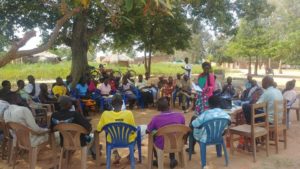
Amani Initiative was mandated to help the government of Uganda through the Ministry of Health to boost it’s own capacity to implement policies and interventions that lead to a wide array of improvements in health outcomes especially concerned with the control of the top child killer diseases within Arua, and Maracha districts.
The CODES project was structured around three main pillars which included:-
1)Improved targeting of interventions to match disease burden at the district level
2)Evidence –based management tools used to improve district health team performance.
3)Increased community oversight to strengthen demand and exact accountability.
The role of Amani Initiative during CODES
Amani Initiative carried out the demand side component of CODES, where ACODE employed a behavioral change communication approach of Community Dialogues” The Community Dialogues that were facilitated in sub-counties in the districts of Maracha and Arua were meant to be a vehicle for Empowerment of people in communities to demand for and receive better health services.
Through engaging trained facilitator’s post-dialogue community monitoring visits were held in held in communities that participated in the 2014, 2015 and 2016 CODES dialogues.
Six community dialogues were held in Arua District and six dialogues inn Maracha District. These dialogues brought together over 500 community members together with their leaders, and health officials to identify the issues facing health delivery and how to solve them. The field notes for both the post-dialogue monitoring visits and community dialogues included information on the breakout sessions, action plans, and community contracts. These notes were used to prepare a publication that was presented to Ministry of Health with key recommendations in the public health sector in Uganda.
Policy recommendations as the result of the CODES project
As the result of the CODES Initiative; the following policy recommendations were put forward under the publication ; “ Assessing the Management and Administration in Public Health Facilities of Uganda and the Implications for the Healthcare Service Delivery and Utilization.” Evidence from the CODES Project. The findings and recommendations from CODES were made public on Friday, 4th November, 2016 at Protea Hotel at aired live on NTV
1)There is need to organize periodic capacity building and training in leadership and human resource management and development for health facility in-charges
2)There is need to employ appropriate innovations and motivation practices for health workers
3) There is need to build trust in healthcare service delivery by having health professionals, managers and public service workers who are trusted to deliver a high quality service. Trust can easily be built at the health centers by ensuring that the health service providers can meet the needs of the users and be available when needed.
4) Strengthening supervision, monitoring and inspection of lower health facilities
5) Organizing periodic cross-district and intra-district peer to peer learning sessions by central and local governments to consider organizing and facilitating these sessions.
6) Ensuring holistic approach in addressing systematic challenges to service delivery

Youth Social & Economic Empowerment
Aflateen Social & Financial Education project
Project Summary
Project Name:- Aflateen Social and Financial Education Program
Project period:- 2016- 2017
Funder:- Private Education Development Network (PEDN)
Geographical area:- Arua and Maracha District
Project Brief
The overall goal of the program was to, “Incorporate social & financial education and activities to help children and youth make sound financial decisions.”
Objectives of the Project:-
- Change in financial behavior and practice among youth
- Enhance the skills and ability of youth to build and preserve financial assets (enterprise assets and money)
- Foster entrepreneurship, employment and economic empowerment among young people.
Amani Initiative took lead in implementing the Aflateen Program in 30 secondary schools for term 1 & 2 in 2015 and 2016.
The Aflateen programme is a curriculum created by the Aflatoun International secretariat that brings social and financial education to youth worldwide. Tailored specifically for this developmental phase, the Aflateen programme not only teaches about finance but also encourages young people to question the world around them.
The Aflateen Program is being implemented in secondary schools in Uganda by the Private Education Development Network with the support of Citibank Uganda Limited under Citi Foundation.
The program used a social & financial education program under the modules below:-
- Module One: Personal Development
- Module Two: – Financial Management
- Module Three: Saving
- Module Four: Financial Service Providers
- Module Five: Social & Financial Enterprises
Project Achievements
Incorporated social & financial education and activities to help 3000 in school children and 500 out of school youth make sound financial decisions within 30 partner secondary schools in Arua District and 5 youth groups. 30 teachers from partner schools received training on usage of active learning methodologies as a tool to improve learning.

Community Empowerement
Ending Child Marriage in Uganda; A CSO Led Advocacy Campaign Project
Girls Not Brides Uganda received a strengthening grant from Amplify Change through Joy for Children Uganda. 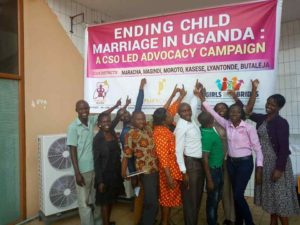
1)Strengthened capacity of CSO network and political mapping, gathering evidence and advocating at national and district levels to combat child marriage in Uganda.
2)To build a sound resource and knowledge base of evidence research, tools and publications to inform, strengthen and guide both the advocacy work and capacity building of the local district governments work on the project.
3) Increased commitment of policy and decision makers at national and district levels to the effective implementation of the NSCM &TP and other laws and strategies related to child marriage.
4) To overcome barriers to implementation of the NSCM &TP at district level by strengthening the understanding, support and capacity of district and sub-county level officials to implement the NSCM & TP.
Amani Initiative implemented the project in Maracha district with a focus on four sub-counties of Yivu, Nyadri, Kijomoro and Olufe as well as the district Town Council. The selection of the sub counties where selected due to the high prevalence of child marriage and teenage pregnancy in those particular areas as demonstrated below:-
1)Kijomoro subcounty (39.9% )
2)Nyadri sub county (22.6%)
3)Yivu Sub county (20.2% )
4) Oluffe Sub County (17.4%)
Key achievements under the project
1)There has been an increased awareness on the issue of child marriage in the district and key stakeholders are getting more involved such as religious leaders, police, elders, and youth.
2) Amani Initiative has been able to directly involve champions in creating awareness on the issue of child marriage in the community.
3) Nyadri Sub-County has adopted the National Strategy against child marriage in its 2018/19 budget and work plan it will be presenting to the district.
4) By laws on late night markets, discos have been enacted in Kijomoro Sub-County which will help in reducing the risk of child marriage.
5)The media has been greatly involved in this advocacy whereby local radio stations in west Nile like. Radio pacis, Arua one fm broadcasted in news what we are advocating about during the launch of the project.
6) Three cases of child marriage were reported to the police in Kijomoro Sub-County with only one case forwarded to the courts of law. The other 2 cases were dropped due to lack of evidence.
7) The district education department has out in place 2,000,000/= towards supporting marginalized girls to stay in school.
8) 3 child mothers have been integrated back to school to avoid the risk of being married off by their parents.
9) The police has conducted 5 community police dialogues in which they shared with the community on laws against child marriage and how to report these cases.
10) The SOVCC and DOVCC are now more aware of the National Strategy against teenage pregnancy & child marriage and they are putting in place strategies on how to include these activities in their work plan
11) 8 community dialogues on child marriage organized in Oluffe, Kijomoro, Oleba and Nyadri sub-counties with 300 participants. These dialogues have enabled the project to reach out to other community stakeholders such as the elders and cultural leaders who have a strategic role in the fight against child marriage at the community level.
12) Oluffe Sub County has formed the trading center committees to make sure that market days are started early and close early at least by 7:30 pm all markets should be closed. Late markets were realized as platforms which influence bad behaviors amongst adolescents that could lead to teenage pregnancy and child marriage.
13) Oluffe Sub County is not awarding licenses for disco operation in the sub county as discos’ in the community don’t have age restriction which puts teenage girls at the risk of teenage pregnancy and child marriage.
14) The district has set up a system to collect data on Orphans and Vulnerable Children (OVCs) who are at high risk of child marriage but data not yet collected.
15) Communication from secretary for social services indicated that the DOVCC and SOVCC are now active in the district and sub county levels.
16) School sensitization’s at Lamila Ciru Primary School and Ombinyiri Primary School reaching out to over 1200 youth with information on how to protect themselves against child marriage.
17) District champions have continued to spearhead initiatives on ending child marriage through sensitization at churches, community gatherings and also taking part in project activities
Economic Empowerement
Ama Ecora Teenage Parents Entrepreneurship Project
Teenage Pregnancy & Child Marriage usually denies the victim an opportunity to education which might lead to unemployment and poverty. As a solution to the impact of teenage pregnancy & early marriage, Amani Initiative engaged the LC One of Anyavu village (Yivu Sub-County) Maracha to identify teenage parents for a one year entrepreneurship project. This project was launched on 1st March 2013 with 4 week entrepreneurship training at Yivu Abea Church of Uganda. Topics covered included marketing, opportunity identification, business planning and financial management.
Child protection and community empowerment
Prevention and Responding to Child Marriage and Early Unions Project
Project Summary
Project Name:- Step By Step
Project period:- 2016
Funder:- Founder Members
Geographical area:- Arua District
Project Brief
Amani Initiative received funding for 12 months (15th May, 2019 to 14th May,2020) from Capital for Good to carry out activities aimed at the prevention and responding to child marriage and early unions in Maracha district aligned under 4 core strategies.
1) Strategy 1: Advancing girls’ leadership by working directly with girls
2)Strategy 2: Mobilizing families, communities, and influence rs
3)Strategy 3: Providing direct services to at-risk, married, and formerly married girls
4)Strategy 4: Advocating for the establishment and implementation of effective laws and policies
As part of the project Amani Initiative supported the formation of two girls’ parliaments, one in each of the two sub-counties of Oluffe and Oleba in Maracha District. Each parliament consisted of 10 representatives and each group of leaders included girls who are in and out-of school, married girls and/or teenage mothers, and girls with a physical disability.

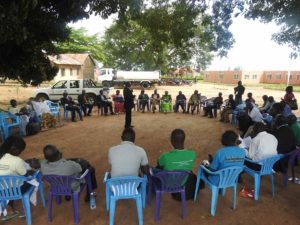
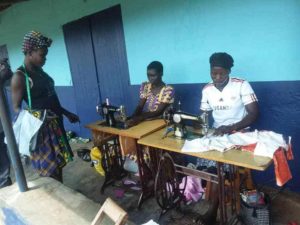
Results from the project.

Emergency Response
Tualu Ama Ecora Campaign
On December 31, 2019 The Government of China reported a cluster of cases of pneumonia of an unknown strain transmitted from person to person in Wuhan city, Hubei Province. A novel coronavirus was then identified and scientifically code-named COVID-19. On January 30, 2020 the World Health Organization (WHO) declared the COVID-19 outbreak a public health emergency of international concern. On March 11, 2020, WHO declared the COVID-19 outbreak a Pandemic. Most of the world’s countries and territories have now reported at least one confirmed case of COVID-19, and the risk of continued spread between and within countries is very high.
Covid-19 Response under Tualu Ama Ecora Campaign
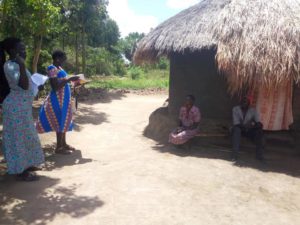
Amani Initiative partnered with West Nile Youth Empowerment Center (WYEC) and other CSO’s within Arua District to implement the Tualu Ama Ecora Campaign (An initiative of West Nile Youth Empowerment Center initiative) aimed to respond to Covid-19 through the tagline Act Now,Reach Out,Speak Out. Tualu Ama Ecora a Lugbara word means “Together We Can”
Objectives of the Tualu Ama Ecora Campaign
- Mobilize all sections of society to act and prevent Covid-19
- Increase information on COVID-19 in grassroots Communities through door to door information dissemination among the public regarding the COVID-19 and how best to save ourselves from being victims of this pandemic using the Ministry of Health and World Health Organization Guidelines.
- Reduce cases of gender based violence and child abuse at household levels due to Covid-19 lock-down effect.
- Food relief to vulnerable households that were depending on hand to mouth.
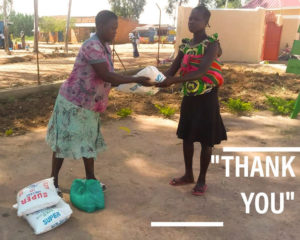


Emergency Response
Hear Us Out-voices that speak for thousands (VOICES AGAINST DEFILEMENT) project
This was a 3 months study about the rising rates of Defilement in Uganda despite the existing laws with emphasis on geographical location and age (1/8/2013-1/11/2013).
Despite the existence of strong laws and the recent sentencing guidelines, defilement cases are on the rise with 7,690 cases reported in 2011 with most not reported to police. Quoting Inspector General of Police (Lt.Gen.Kale Kayihura), “Parents use this case to defeat justice and achieve monitory gains.”
The failure of the law in regard to defilement has had a direct impact on the increasing levels of teenage pregnancy with Uganda having one of the highest rates in the world at 24% of her teenage girls.
Defilement has an adverse effect to the psychological, health and social development of a victim and her/his family. Ignorance of the law, lack of a birth registration policy, poverty, corruption and cultural rigidity has denied the victims and their families any form of justice.
Ignorance of immediate responses to defilement and accessibility to health center for the Post Exposure Prophylaxis (PEP) Treatment has also led to some of the defilement victims to acquire HIV/AIDs.
This study was carried out in 7 districts covering target group from Urban Centers, Rural Centers, SemiUrban Centers, Children ( 8-20 years), policy makers ( police, judiciary & local leaders) with more than 2300 individuals directly taking part.
The study was intended to come with the gaps that have resulted into the failure of the existing laws to curb the issue of defilement in Uganda.
The study also went ahead to ascertain individual concepts about defilement and level of sensitization especially amongst the young people. 1764 young individuals between (8-20) were directly engaged in the study through sensitization and an essay/poem writing competition to empower their knowledge and fight against defilement.
The study also included various community leaders from Yumbe, Maracha, Kampala and Kaliro Districts. The general public was also engaged through 2 Radio Talk Shows organized by Radio Pacis in Arua District and A Poetry & Music Evening on 1 st October at the Uganda Museum.
To learn more about the study findings download report (Hear-Us-Out-voices-that-speak-for-thousands-VOICES-AGAINST-DEFILEMENT-Final-Report-2013- )

Education
BoyzTalk
Project Summary
Project Name:- School Business Accounting and Finance (SBAF) Training
Project period:- 15th July, 2020- 16th July, 2021
Funder:- Anonymous
Geographical area:- National
Project brief
Nelson Mandela once said, “Education is the most powerful weapon we can use to change the world.”
Since the government of Uganda decision in 1993 to liberalize the education sector, thousands of schools and institutions have been set up by private investors. In the secondary sub-sector, the number of private schools, at about 4000, is more than double the number of government-funded schools. This has enabled increased access to equality and quality education for many boys and girls across the country which is one of the strongest weapons against teenage pregnancy and child marriage.
Unfortunately most of these schools are started up by business people who don’t have the skills of education administrators but mainly focus on making profits which leads them not to prioritize the financial management of these schools which puts their survival and growth at a high risk. The situation has been worsened by the Covid- 19 pandemic prevention guidelines by the Government of Uganda which saw all schools closed as at Friday, March 20th, 2020 with the dates of re-opening not clear as yet.
The School Business Accounting and Finance Training (SBAFT) project will be supporting over 200 low cost private schools to be in position to withstand the financial pressure of Covid-19 to their schools through demand driven skills training in areas of business development, accounting, financial management and loan readiness.
With the necessary business development, accounting, and financial management skills we expect these schools to be in position to not only survive during the lock down but also be in position to smoothly open once the lock down restrictions have been lifted by the Government of Uganda due to development of alternative school income generating projects apart from school fees and also access to low cost financing.
Project Outcomes
Outcome #1. Schools know how to manage their financial activities and working together in supporting and improving the financial management of your school.
Outcome #2 School understand their roles in relation to accountability and transparency.
Outcome #3 Schools understand the responsibilities of the Board of Management and the Head Teacher in school budgeting and planning,
Outcome #4 Schools understand how the Head Teacher and the Board of Management need to work cooperatively together.
Outcome #5 Schools understand their roles and responsibilities in the recording and reporting of financial information.
Outcome #6 Schools understand how they can prepare themselves to get and manage a loan.
Outcome #7 Schools understand the Basic Requirements and Minimum Standards Indicators for Education Institutions in relation to Finance Generation and Management.
Learning areas on school Budgeting, Accounting and Financial Management
- Topic 1: Who is the Accountable Financial Management Officer for schools.
- Topic 2: School Income
- Topic 3: Budgeting for a school
- Topic 4: Keeping and maintaining school financial records and statements.
- Topic 5: Petty Cash management
- Topic 6: Accountability of funds
- Topic 7: Getting and managing a school loan
- Topic 8:- Starting a school income generating project.




